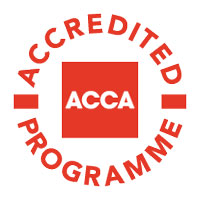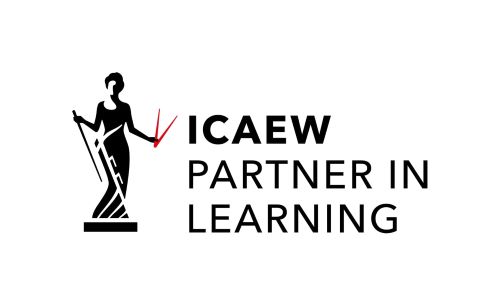Undergraduate Course
Accounting and Finance BA (Hons)
Prepare for a dynamic career in a finance profession. Develop numerical skills as well as an ability to analyse and problem solve.
/prod01/yorksjacuk/media/Classroom-teaching-12.webp)
If you are thinking of a career as an accountant, business owner or in a professional practice, a knowledge of accounting and finance is essential. Gain this knowledge and valuable experience, engaging with businesses to excel in your future career.
- Available in Clearing
Please note accreditations may be subject to change, and are dependent on fulfilling the awarding bodies criteria.
York campus
- UCAS code – N1N2 (N4N3 with placement year)
- Duration – 3 years full time, 4 years full time with placement
- Start date – September 2025, September 2026
- School – York Business School
Minimum entry requirements
104 UCAS Tariff points
3 GCSEs at grade 4/C (or equivalent) including English Language. Grade 5 in Maths.
Tuition fees
UK 2025 entry £9,535 per year full time
International 2025 entry £12,100 per year full time
Discover Accounting and Finance at York St John University
Accounting and Finance
Sarah Fitzgerald, Course Leader in Accounting and Finance, introduces us to the subject at York St John University.
WREL at York Business School
Work related experiential learning (WREL) is a key part of studying at York St John University and prepares you for success after graduation. Hear from our students about the opportunities it has led to for them and our staff about how it is embedded in our courses.
Course overview
This course will introduce you to the principles and practice of Accounting and Finance. You will gain a thorough understanding of accounting concepts, which is ideal if you want to become a professional accountant. Having accounting and finance knowledge is an advantage in any profession today, from being a stockbroker to an economist. So even if you do not want to become a professional accountant, you will find this degree invaluable.
You will take part in lectures, seminars, workshops, task focused activities, field trips and excursions as part of this course. You will also engage with industry practitioners. Each year we offer employer talk back events, this gives you the opportunity to hear from Accountants currently working in a variety of organisations and learn about their career paths and the opportunities for graduates in their organisations.
Take a look at distinct course features that set it apart:
- A focus on employability and getting you ready for the workplace.
- Tutors who are active researchers and will use their knowledge to help you develop yours.
- Dedicated 1 on 1 support from your personal tutor to help you reach your potential and seminar sizes of 20 to 25 students.
- Focus on the areas of your learning that matter to you, with options on module focus and support specific to you.
You will have the opportunity to take part in the off campus Sage course, you will learn about Sage accounting software and how this is used in practice. Sage is the market leader for integrated accounting, payroll, and payment systems, supporting the ambition of the world’s entrepreneurs.
As a Business School we are passionate about social responsibility and sustainability. These values and this commitment will be embedded throughout this course. We are a Principles of Responsible Management Education (PRME) signatory for the United Nations. Our mission is to develop your potential so that you can make a difference in society.
On completion of your studies you will have the opportunity to claim exemptions from the Association of Chartered Certified Accountants (ACCA), Institute of Chartered Accountants in England and Wales (ICAEW) and /or Chartered Institute of Management Accountants (CIMA).
We are recognised as an ICAEW Partner in Learning, working with ICAEW in the professional development of students. As a global professional body for chartered accountants, they promote inclusivity, diversity and fairness. They believe that chartered accountancy can be a force for positive change and continue to work with governments, regulators and business leaders globally as their method to serve the public interest.
Through the Accounting and Finance Course, you will have the opportunity to partake in the CIMA scheme, CIMA is the global professional management accounting body based in UK. They offer training and qualifications in management accountancy, focusing on accountants working in, or studying for a career in the industry.
Course structure
Year 1
Our academic year is split into 2 semesters. This course can only be studied full time.
In your first year, you will study:
- 3 compulsory modules in semester 1
- 3 compulsory modules in semester 2
You can find out which modules are available in each semester on the Course Specifications.
Modules
Credits: 20
Compulsory module
On this module you will learn the basic principles of microeconomics and macroeconomics. You will develop an understanding of economic principles and techniques and learn how to apply them in business contexts. You will also investigate the different issues related to macroeconomic theories and gain insight into the impact of the macroeconomic environment on business decisions.
Credits: 20
Compulsory module
This module is your introduction to basic concepts and methods in a variety of business settings. You will explore the principles of financial control, including standard costing and budgeting. You will learn how to record, process and report on business transactions and events. You will also produce financial statements.
Credits: 20
Compulsory module
During this module we will introduce you to the accountancy profession and the organisations and environments they operate in. This includes:
- Capital markets
- Financial institutions
- Government, non-profit and business organisations.
You will learn what an accountant’s role is within organisations and how they work and communicate with other stakeholders. Your tutors will help you identify and develop your skills in preparation for future employment opportunities.
Credits: 20
Compulsory module
On this module you will learn the process of preparing financial statements for unincorporated and incorporated entities. This will include partnership and limited company accounts.
Credits: 20
Compulsory module
On this module we will teach you the essential quantitative methods of modelling and analysis for financial data. You will also explore statistics and probability concepts. You can then use these theories to analyse practical situations.
Credits: 20
Compulsory module
On this module we will introduce you to the concepts of cost accumulation, allocation and apportionment in a variety of business settings. You will explore the principles of financial control, including standard costing and budgeting. You will also develop your skills in analysing accounting information and decision making.
Year 2
In your second year you will study:
- 3 compulsory modules in semester 1
- 4 compulsory modules in semester 2
You can find out which modules are available in each semester on the Course Specifications.
Modules
Credits: 20
Compulsory module
In Year 1 you will have learned the basic principles of financial accounting. On this module you will develop these further and in greater depth. You will focus on the reporting of financial information for companies in accordance with relevant standards. Additionally, you will learn how to analyse and interpret the financial information of different companies.
Credits: 20
Compulsory module
On this module we will introduce you to the framework of English law. You will develop knowledge and skills in the areas of contract law, agency law and Tort (a wrongful act or an infringement of a right leading to legal liability). You will also learn about the formation and running of partnerships and companies. This will provide a foundation for study in Year 3 in the areas of corporate governance, directors and auditors as agents.
Credits: 20
Compulsory module
On this module you will study the principles of management accounting. We will introduce you to elements of strategic analysis and long term decision making. You will also consider how budgeting impacts human behaviour. This ensures you develop your understanding of management accounting techniques within the organisation as a whole.
Credits: 10
Compulsory module
On this module you will gain an understanding of the auditing procedure, along with learning about contemporary issues relating to this practice. Whether you aspire to a career as a professional accountant or in industry, commerce, or general management, a sound understanding of the principles underlying auditing is essential. You will gain an awareness of issues such as ethical conduct, quality assurance and practice development.
Credits: 10
Compulsory module
On this module you will gain an understanding of taxation policies and principles, together with a detailed knowledge of income taxation. You will investigate the fiscal policies and principles of income taxation, and will learn how to understand and evaluate the mechanisms for calculating personal tax liabilities. You will also develop skills in tax planning and computation, and appreciate the importance of accuracy and integrity in a professional environment.
Credits: 20
Compulsory module
Building on your knowledge from previous studies about investment, you will learn to use your skills in a broader business context that involves risk. This will include understanding the various sources of finance, as well as the overall cost of capital to businesses and investment opportunities.
Credits: 20
Compulsory module
This module will help you to further develop managerial accounting techniques. You will focus on skills related to planning, control and decision making at an operational and tactical level. You will learn about the ethical and financial consequences of such decisions.
Year 3
In your third year you will study:
- A dissertation module. You can choose either a 20 credit option or a longer 40 credit option which is spread across semesters 1 and 2
- 2 compulsory modules and 1 optional module in semester 1
- 2 compulsory modules and 1 optional module in semester 2
You can find out which modules are available in each semester on the Course Specifications.
Optional modules will run if they receive enough interest. It is not guaranteed that all modules will run every year.
Modules
Credits: 20
Compulsory module
This module builds upon your knowledge of financial management gained from the Corporate Finance module in Year 2. You will learn to critically examine the theory of business finance and its contribution to decision making. The valuation of a business or share is a crucial skill in financial management and we will introduce you to different techniques in the context of financial management. This includes the role of dividends and share buybacks.
Credits: 20
Compulsory module
On this module you will examine advanced issues in management accounting. You will learn about the accountant’s role in providing information for strategic planning and decision making, control and performance management. You will consider recent developments on cost management and the integration of cost accounting with modern manufacturing techniques. You will also investigate the connection between management accounting and strategic management.
Credits: 20
Compulsory module
On this module you will continue your exploration of accounting standards. You will learn how to produce consolidated financial statements for a group of companies, including an associate. You will also critically evaluate current developments and debates related to financial reporting.
Credits: 20
Compulsory module
On this module we will introduce you to corporate governance. You will explore its role in the regulation and direction of corporations. You will also investigate the role of directors and other key stakeholders. Corporate governance is an important part of everyday business. You will gain an understanding of how this process has developed and consider how to improve the behaviour of those involved in corporate governance in the future. This module aims to develop your understanding of the financial environment.
Credits: 40
Optional module
This module is your chance to plan and conduct a piece of independent research. You will be able to choose from the following projects:
- Traditional dissertation: Plan and conduct a piece of independent research. Present your findings in a writing.
- Business Research Project: Complete a small scale piece of individual research work.
- Consultancy Project: Work with industry professionals and investigate a business project and produce a research based report.
- Business creation project: Develop a full business proposal and plan. Use primary and secondary research to support your work.
Credits: 20
Optional module
This module will help you evolve your knowledge and understanding of auditing. You will learn about the technical language and practices of auditing. We will also teach you to review and test transactions and other financial events to arrive at an audit opinion.
Credits: 20
Optional module
On this module you will learn about taxation policies and principles. This will mean gaining detailed knowledge of:
- corporate tax
- Value added tax (VAT)
- capital gains tax
- inheritance tax computations
Teaching and assessment
Teaching and learning
All of your modules will be delivered using a variety of different teaching sessions. This includes:
- Lectures
- Seminars
- Guest speakers
- Workshops
- Events
Each module has 3.5 hours of contact time a week. This consists of a 1.5 hour lecture and a 2 hour seminar. 1 to 1 time can be booked through our tutorial booker system.
You will also have regular individual tutorial sessions with your academic tutors to support your learning. You will also have opportunities to gain work experience through modules which will take your learning beyond the classroom and into the city.
Assessment
We use a wide variety of assessment types, which help you to develop skills relevant to the workplace. This includes:
- Written assignments
- Individual and group presentations
- Exams
- Practical activities
You will receive feedback on your work throughout each module. This will help you to improve your work for your graded assessments. We will advise you on developing your skills, useful areas for research and how to extend your business knowledge further.
Professional Skills
We encourage you to extend your learning through Continuing Professional Development as you study. Our Success Lab provides extra events, short courses and opportunities to help you make the most of your degree. The academic and professional skills you develop through this will help to boost your employability when you graduate.
Career outcomes
Your future with a degree in Accounting and Finance
This course will prepare you for a career in a finance profession. You will develop numerical skills as well as an ability to analyse and problem solve. The knowledge you gain of global business organisations and issues will open up a range of career options.
A degree in Accounting and Finance could be the first step in your career as a:
- Chartered accountant
- External auditor
- Stockbroker
- Data analyst
- Economist
- Mortgage adviser
Discover more career options on Prospects careers advice pages.
You could also progress onto a postgraduate degree and take your learning even further.
Alumni stories
Visit our YSJ Snapshots blog to see what our past students from across the University have done with their York St John degrees.
Whatever your ambitions, we can help you get there.
Our careers service, LaunchPad provides career support tailored to your ambitions. Through this service you can access:
- Employer events
- LinkedIn, CV and cover letter sessions
- Workshops on application writing and interview skills
- Work experience and volunteering opportunities
- Personalised career advice
This support doesn't end when you graduate. You can access our expert career advice for the rest of your life. We will help you gain experience and confidence to succeed.
Entry requirements
Qualifications
Minimum entry requirements
104 UCAS Tariff points
3 GCSEs at grade 4/C (or equivalent) including English Language. Grade 5 in Maths.
Calculate your UCAS Tariff points
International students
If you are an international student you will need to show that your qualifications match our entry requirements.
Information about international qualifications and entry requirements can be found on our International pages.
If English is not your first language you will need to show that you have English Language competence at IELTS level 6.0 (with no skill below 5.5) or equivalent.
International entry requirements
This course is available with foundation year
If you do not yet meet the minimum requirements for entry straight onto this degree course, or feel you are not quite ready for the transition to Higher Education, this is a great option for you. Passing a foundation year guarantees you a place on this degree course the following academic year.
Mature Learners Entry Scheme
If you have been out of education for 3 years or more and have a grade C GCSE in English Language and Maths or equivalent, you are eligible for our entry scheme for mature learners. It's a scheme that recognises non-traditional entry qualifications and experience for entry onto this course. Information on how to apply can be found on our dedicated page.
Advanced entry
Considering transferring to join us in year 2 or 3 of our Business Courses? Please see our Advanced Entry page for information on the courses available and how to apply.
Terms and conditions
Our terms and conditions, policies and procedures contain important information about studying at York St John University. You can read them on our Admissions page.
Fees and funding
To study for a degree with us, you will need to pay tuition fees for your course. How much you pay depends on whether you live inside the UK, or internationally (outside the UK).
Tuition fees are reviewed annually and may be increased in line with inflation, prior to the start of each academic year, and subject to the fee cap set by the UK government. Such increases to fees will be at the Retail Price Index (RPI) forecast rate, as advised by the Office for Budget Responsibility and the Office for Students. The only exception to this would be where government legislation deems otherwise.
If a rise in the tuition fee becomes necessary, we will endeavour to inform you as soon as possible and we will explain the reason(s) for the increase. Any tuition fee increase will only be applied from the start of the next academic year and will not be applied 'in year'.
UK 2025 entry
The tuition fee for 2025 entry onto this course is £9,535 per year for full time study.
This price applies to all UK, Jersey, Guernsey and Isle of Man students.
You can find out more about funding your degree by visiting our funding opportunities page.
Placement year funding
If you choose to take a placement year, and your course offers it, you can apply for the Tuition Fee and Maintenance Loan for your placement year. How much you are awarded is based on the type of placement being undertaken and whether it is a paid or unpaid placement. The tuition fee for your placement year will be reduced.
Tuition fees
UK 2025 entry £9,535 per year full time
International 2025 entry £12,100 per year full time
International 2025 entry
The tuition fee for 2025 entry to this course is £12,100 per year for full time study.
This price applies to all students living outside the UK.
Due to immigration laws, if you are an international student on a Student Visa, you must study full time. For more information about visa requirements and short-term study visas, please visit the International Visa and Immigration pages.
Find out more about funding your degree.
Additional costs and financial support
There may also be some additional costs to take into account throughout your studies, including the cost of accommodation.
Course-related costs
While studying for your degree, there may be additional costs related to your course. This may include a DBS check, purchasing personal equipment and stationery, books and optional field trips.
Study Abroad
For more information on tuition fee reductions and additional costs for studying abroad, please visit our study abroad pages.
Accommodation and living costs
For detailed information on accommodation and living costs, visit our Accommodation pages.
Financial help and support
Our Funding Advice team are here to help you with your finances throughout your degree. They offer a personal service that can help you with funding your studies and budgeting for living expenses.
For advice on everything from applying for scholarships to finding additional financial support email fundingadvice@yorksj.ac.uk.
Course highlights
Career Focused Opportunity
Through relationships with The Chartered Institute of Management Accountants (CIMA), Institute of Chartered Accountants in England and Wales (ICAEW), Association of Chartered Certified Accountants (ACCA) and the off campus SAGE course, you can develop career specific skills and qualifications, giving you the ability to make the most of your time during your degree.
Extra Support
Within the business school you will have access to an additional 30-minutes of support built into our seminar time for students. This is offered as extra support that our students can have for an informal discussion surrounding assessment, university life or just a friendly face to talk to.
Principles for Responsible Management Education (PRME)
York Business School is one of only a few Business Schools to be a signatory of the United National Principles of Responsible Management Education (PRME). PRME have identified 17 Sustainable Development Goals (SDGs) that address some of our most critical economic, social, environmental and governance challenges. All of our courses are aligned to these goals, and we also contribute to the goals through our research.
.png)
Charlotte Accounting and Finance
This course has really helped to prepare me for going into the ‘working world’. Most of my modules related to the reality of life in the business world. My lecturers had all previously worked in the industry which meant that we had some great links to industry. We would have guest talks and links for work experience placements. For example, my Tax lecturer was able to set up 3 days work experience for me and 2 others at BHP (a local chartered accountants office). It’s made the idea of getting a graduate job a little less daunting!

Hannah Accounting and Finance
The lecturers go above and beyond to ensure you have the best chance at fulfilling your potential. Throughout the degree, there are many opportunities to volunteer, building on your CV, something that looks great to employers. There are also additional services available with the careers department, from CV checks to mock assessment centres. Accounting and Finance gives you the opportunity to explore career paths you never knew existed.
Ella Accounting and Finance
I learnt basically everything there is to know about accounting: how to balance my time; how to prioritise things such as exam preparation; a lot about the world of business. We did a lot of case study sessions which really helped me understand things in perspective. My placement year massively helped me prepare for the working world and understand what to expect when starting my career properly.



/prod01/yorksjacuk/media/content-assets/safe-images/undergraduate-course-pages-2021/carousel-1600x1200/Accounting-and-Finance-Carousel-2.jpg)
/prod01/yorksjacuk/media/content-assets/safe-images/1600-x-1000/Marketing-group.jpg)
/prod01/yorksjacuk/media/content-assets/safe-images/1600-x-1200/PRME-carouse.jpg)

/prod01/yorksjacuk/media/content-assets/safe-images/500-x-500/YORK-SHOTS---WEB-23-(1).jpg)
/prod01/yorksjacuk/media/content-assets/2019-courses/decision-day.jpg)
/prod01/yorksjacuk/media/content-assets/safe-images/500-x-500/why-choose-YSJ-500x500.jpg)
